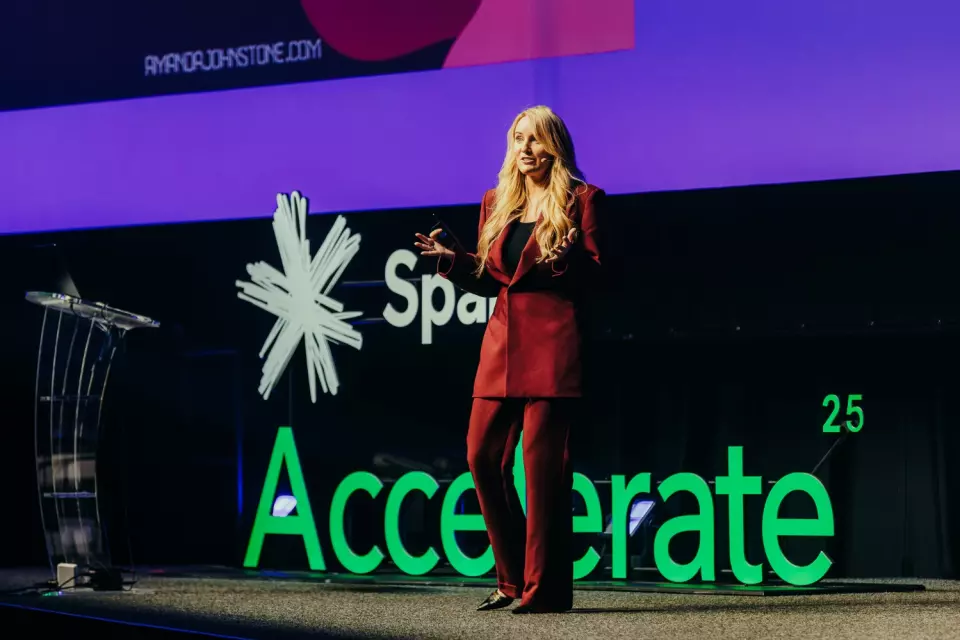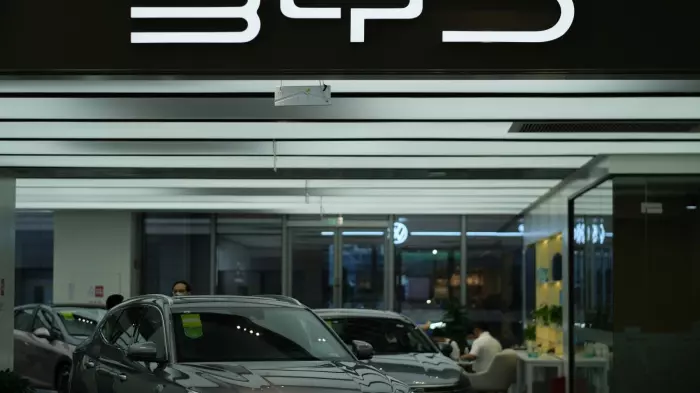The AI transformation is here and it’s accelerating at an exponential rate. How do we handle the uncertainty, navigate the volatility, harness the potential, and stay ahead of the curve?
Those were the big questions driving discussion at the Spark Accelerate 2025 summit, where business and technology leaders convened to map out what exponential AI growth means for productivity, competitiveness, and the future of work in New Zealand.
Exponential growth requires flexibility and resilience
The speed and scale of the AI transformation was the defining theme of the Accelerate summit. As Mark Leadbetter, director of IT for House of Travel, told the Auckland crowd, “disruption is a permanent backdrop in our industry. From the shutdown to the boom, to supply chain chaos, to AI, there are challenges – but also opportunities.”
To keep up with the pace, organisations must be resilient and flexible.
“Transformation is not a project, it’s a capability – a capability you need to build into the way you think about things,” said Scott Pyles, CTO at Fonterra, during his Lightning Talk on November 12. He emphasised that uncertainty is inevitable and the only thing you can completely control is your response: “We can’t control the storm; we can only control the way we sail through it.”
Jodi Russell, head of infrastructure and operations at Fire and Emergency NZ (FENZ), knows plenty about storms. She discussed the inherently unpredictable nature of emergency response: “Disruption is a constant. The challenge is how we plan for uncertainty. Any transformation has to strengthen our reliability and not compromise it.”
One of the international speakers had first-hand experience of emergency response technology. Ian Chong, regional director and head of enterprise at Samsung Electronics, had a minor car crash while driving in his homeland of Singapore. First responders there use Samsung devices to capture and transmit information about health and incidents, allowing for rapid, coordinated services. After recovering from the initial shock of his crash, Chong said, “the first thing I saw was a tablet. I was excited to see frontliners keeping us and themselves safe with technology.”
AI anxiety? You’re only human
If the constantly changing face of technology is making you feel nervous, you’re only human, said Professor Joel Pearson, cognitive neuroscientist at University of New South Wales.
He explained that we haven’t evolved to handle exponential growth and constant change: “Depending on how you measure it, AI use is doubling every six months. It’s changing everything, and trying to predict it is almost impossible. We’re living in a world of uncertainty, and that kind of uncertainty triggers anxiety and stress in animal brains.”
To avoid this feeling becoming a source of chronic stress, Pearson recommended embracing uncertainty and learning to reframe it as an exciting opportunity.
Ultimately, though, the benefits of AI can win over even the most reluctant technophobes, noted Amanda Johnstone, technology futurist and CEO of Transhuman. She introduced the audience to ‘the Internet of You’, which includes all your personal data: medical, identity, biometric and more. Neural laces, ingestibles, tooth caps, implantables and wearables are all part of this new internet.
“My dad has a pacemaker with Bluetooth, so his cardiologist knows if he's had an event or [the device] needs an update. My dad is a hillbilly, and he hates what I’m doing… but he’d never turn it off.”
Security, privacy and data sovereignty a major concern
Safety was a critical consideration for Spark Accelerate speakers, whether they were talking about personal information, enterprise data, or national security.
At a global level, Johnstone is currently working with the Australian Government on an A$10 million sovereign technology project. She also touched on the need to protect our personal data as the IOU develops. At the enterprise level, Russell talked about how FENZ is taking every precaution to protect the data of everyone it comes into contact with.
The threat of a data breach has never been higher as threat actors, even inexperienced ones, are using AI to scale up their attacks. However, AI is also part of the solution, and one breakout session focused on how it can identify unusual patterns of activity to spot threats early.
You can make AI do almost anything – staying focused is the challenge
You can now use an AI app to build your own agentic AI bot, without needing deep technical expertise, as Spark’s experts demonstrated in another breakout session. This ease of use makes it tempting to throw AI at everything – so staying focused on the right opportunities is essential.
Martin Norgrove, head of data and AI for Spark Qrious, said that AI applications must genuinely further the company’s goals and deliver value for money. “Otherwise the platform itself can become the outcome. Risks can emerge when the technology becomes expensive but value isn’t being created.”
Sarah Carney, CTO of Microsoft A/NZ, agreed that it’s vital to be “an enterprise of intent”. She described ‘frontier firms’ that will lead the way through a three-phase AI transformation:
- Phase one pairs humans and AI assistants (like Copilot); this is where most Kiwi businesses are now.
- Phase two is human-led AI agents. For example, Carney has an AI research agent that prepares her for every meeting without prompting.
- Phase three is human-led, agent-operated businesses, where agentic AI is making decisions before you even ask it to.
Getting to phase three will require business-wide co-operation, she added. “To truly be a frontier firm, you need to think about your organisation’s structure. To enable AI agents, the structure is going to look flatter, with fusion teams across departmental boundaries.”
“Realise the benefits of this moment”
The transformation is underway, but right now, most of us are merely using AI to do our usual tasks more quickly. That’s useful, but it’s only the start, Carney explained.
“When you focus on speed, you reach a point at which you can go no faster… you’re capping the opportunity to transform or improve your return on investment.”
Instead, she advised, find a way to “reinvent work, lift your entire organisation and realise the benefits of this moment.”
As AI continues to evolve at an exponential pace, the question for New Zealand businesses isn’t whether to adopt, but how fast they can align structure, skills, and governance to capture value. If Spark Accelerate 2025 made one thing clear, it’s that productivity gains will be won by the organisations that treat AI not as a project, but as a capability.






